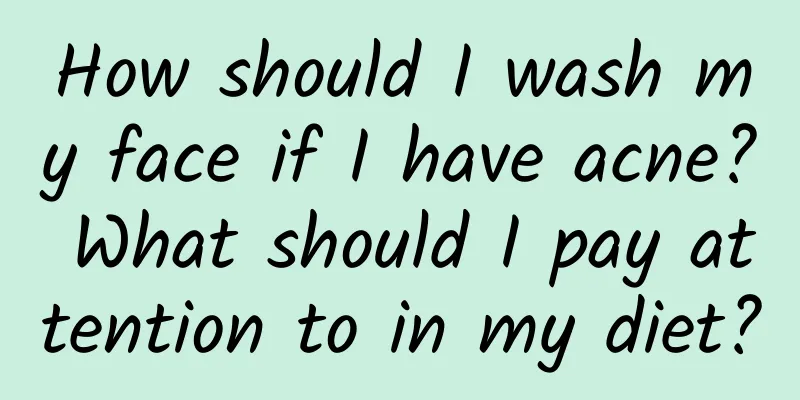How should I wash my face if I have acne? What should I pay attention to in my diet?

|
Author: Cai Lin, Chief Physician, Peking University People's Hospital Reviewer: Yang Dingquan, Chief Physician of China-Japan Friendship Hospital Almost all of us have had pimples, also known as acne. In those days when we have acne, there are many daily problems that bother us. For example, how to wash your face when you have acne? Can you still put on makeup? What should you pay attention to in your diet? Let's learn about it together. 1. How to wash your face if you have acne? We all know that oil can only be removed with warm water, so you must use warm water to wash your face, so that the oil on the surface of the skin can be washed away, so try not to wash your face with cold water. But many people will ask, washing your face with warm water every day will cause the hair follicles to become enlarged and look ugly, so what should you do? You can do this by washing your face with warm water at 38-40℃ first, and then immediately apply cold water for about ten minutes. This way, you can clean the hair follicles first and then apply cold water, which can shrink the hair follicles immediately and make the skin more elastic, achieving the best of both worlds. Figure 1 Original copyright image, no permission to reprint In addition, washing your face also varies from person to person. If you have oily skin, it is recommended that you use sulfur soap to wash, because sulfur soap not only has a bactericidal effect, but also has a grease-removing effect. After washing, you can use moisturizer to repair the skin barrier. For people with a lot of acne, you can actually use a mild facial cleanser containing salicylic acid, but the concentration should not be too high, the frequency should not be too strong, and you should not use it every day. For example, you can use it once every two days. Because salicylic acid can cause acne to peel off, but frequent use will make the skin more and more sensitive. Another thing is to use a facial cleanser with fine scrub, which is also good. It can make the opening of the sebaceous glands of the hair follicles more unobstructed and reduce the formation of acne. In a word, you must wash your face well. Don't just wash it quickly and rush out just because you are busy at work or go to school too early. Try to wash your face at least twice a day, and of course three times is best. 2. Can I still wear makeup if I have acne? We now live in an age where beauty is the main concern, and sometimes we need to use makeup to cover up our acne, but such cosmetics may aggravate acne. We must know that concealing cosmetics must have relatively large molecular weights, because only with a large molecular weight can they cover pores and make the skin look smooth. The blockage of sebaceous glands in hair follicles is one of the causes of acne. If you add a layer of concealing cosmetics on the outside of the blocked hair follicles, it will only make things worse. Therefore, we urge everyone to try not to wear too much makeup. If you have to wear makeup due to work needs, try to reduce the time. That is, after applying makeup, if you don’t need it anymore, wash it off immediately. In addition, you must not wear makeup at night when you sleep, so that the hair follicles and sebaceous glands of the skin can be unobstructed and relaxed. So generally speaking, we are not against wearing makeup, but we should try to shorten the time and reduce the frequency. 3. What should you pay attention to in your diet if you have acne? The dietary precautions for acne patients can be summarized as follows: First, it is best to eat light food and eat more vegetables and fruits. Because we know that crude fiber can help with bowel movements, and it is relatively rich in vitamin C and can also whiten the skin. It is best to eat more vegetables and fruits, especially those that are not easy to get angry. Second, eat more whole grains. Because whole grains are rich in vitamin B, which regulates sebum metabolism, eating more whole grains is beneficial. In clinical practice, doctors often prescribe vitamin B6 to patients with acne or seborrheic dermatitis to regulate sebum metabolism, so eating more whole grains is also beneficial for acne patients. Third, eat less greasy, spicy, sweet, dairy products, chocolate, etc. Also, eat less fast food, because fast food is often fried, and sometimes contains more hairy foods, which can easily aggravate acne. Figure 2 Original copyright image, no permission to reprint In addition, some friends often ask, is eating kelp good for acne? First of all, we need to know that kelp contains iodine and zinc. Excessive intake of iodine-containing drugs and foods can aggravate acne. Some reports have found that increased zinc levels can improve acne, but some studies believe that zinc levels have nothing to do with acne. So our current recommendation is to eat it normally. Don't avoid eating kelp because it contains iodine, and don't eat more kelp because you think zinc can improve acne. Therefore, treat kelp as an ordinary food and eat it normally. |
<<: There is clear liquid flowing out of the nasal cavity, which may not be snot, but...
Recommend
The consequences of intercourse after taking suppositories
Vaginal suppositories are generally used to treat...
Is depression just "sentimentality"? In fact, we are not far from it
"Panda Doctor Medical Cartoons" Feed...
Is chest pain normal during ovulation?
Most women pay special attention to their chest p...
What to do if your liver is not in good condition? If you want to maintain your liver, I advise you to do these 5 things and stop burdening your liver
The liver is a very important organ for detoxific...
Does weak positive turn to negative mean ovulation?
The weak positive result in the ovulation test is...
Can acute bronchitis be prevented?
Acute bronchitis is caused by infection with path...
How often should zoledronic acid be used?
In daily life, people may suffer varying degrees ...
How to put a contraceptive ring in women
The so-called female contraceptive ring is what w...
Should I take Chinese medicine for endocrine disorders before or after meals?
Women may develop endocrine disorders due to many...
Female tailbone pain when sleeping flat on back
If a woman experiences coccyx pain while sleeping...
What are the symptoms of mastitis during lactation?
Many women will face the problem of mastitis duri...
Can the core of jackfruit be eaten? How to cut jackfruit
Jackfruit is also known as jackfruit, jackfruit, ...
Postovulatory uterine rectal effusion
The female reproductive system is very complex an...
What to do if your belly is bloated during pregnancy
During pregnancy, various changes will occur in t...









